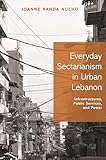Everyday Sectarianism in Urban Lebanon : Infrastructures, Public Services, and Power / Joanne Randa Nucho.
Material type: TextSeries: Princeton Studies in Culture and Technology ; 10Publisher: Princeton, NJ : Princeton University Press, [2016]Copyright date: ©2017Description: 1 online resource (192 p.) : 15 halftonesContent type:
TextSeries: Princeton Studies in Culture and Technology ; 10Publisher: Princeton, NJ : Princeton University Press, [2016]Copyright date: ©2017Description: 1 online resource (192 p.) : 15 halftonesContent type: - 9780691168968
- 9781400883004
- Civil society -- Lebanon
- Infrastructure (Economics) -- Lebanon
- Municipal services -- Political aspects -- Lebanon
- Public welfare -- Political aspects -- Lebanon
- Public welfare -- Religious aspects
- Religion and civil society -- Lebanon
- SOCIAL SCIENCE / Anthropology / General
- Arab Spring
- Arakadz
- Armenian community
- Armenian refugee camps
- Armenian women
- Armenians
- Beirut
- Bourj Hammoud
- Dashnag Party
- Lebanon
- Sanjak
- Shi'a conflict
- Sunni conflict
- Syrian Kurds
- access
- civil war
- credit
- economic networks
- ethnoreligious identity
- foreign municipality
- gendered propriety
- informal neighborhoods
- lending
- microlending
- religious identity
- rotating credit associations
- sectarian community
- sectarian conflict
- sectarianism
- services
- shirkets
- state infrastructure projects
- temporary housing
- violent conflict
- women's organizations
- 306.2095692 23
- JQ1828.A91 N83 2018
- online - DeGruyter
- Issued also in print.
| Item type | Current library | Call number | URL | Status | Notes | Barcode | |
|---|---|---|---|---|---|---|---|
 eBook
eBook
|
Biblioteca "Angelicum" Pont. Univ. S.Tommaso d'Aquino Nuvola online | online - DeGruyter (Browse shelf(Opens below)) | Online access | Not for loan (Accesso limitato) | Accesso per gli utenti autorizzati / Access for authorized users | (dgr)9781400883004 |
Browsing Biblioteca "Angelicum" Pont. Univ. S.Tommaso d'Aquino shelves, Shelving location: Nuvola online Close shelf browser (Hides shelf browser)

|

|

|

|

|

|

|
||
| online - DeGruyter Competition in the Promised Land : Black Migrants in Northern Cities and Labor Markets / | online - DeGruyter Dictators and Democrats : Masses, Elites, and Regime Change / | online - DeGruyter Democracy's Infrastructure : Techno-Politics and Protest after Apartheid / | online - DeGruyter Everyday Sectarianism in Urban Lebanon : Infrastructures, Public Services, and Power / | online - DeGruyter An Age of Risk : Politics and Economy in Early Modern Britain / | online - DeGruyter A History of the ‘Alawis : From Medieval Aleppo to the Turkish Republic / | online - DeGruyter A Place at the Altar : Priestesses in Republican Rome / |
Frontmatter -- Contents -- List of Illustrations -- Note on Language -- Acknowledgments -- Introduction -- Chapter 1: All That Endures from Past to Present Temporality, Sectarianism, and a "Return" to Wartime in Lebanon -- Chapter 2: Permanently Temporary Constructing "Armenianness" through Informal Property Regimes -- Chapter 3: Building the Networks NGOs, Gender, and "Community" -- Chapter 4: From Shirkets to Bankas Credit, Lending, and the Narrowing of Networks -- Chapter 5: The Eyes of Odars City-to- City Collaborations and Transnational Reach -- Conclusion Far More Dangerous Times -- Notes -- References -- Index
restricted access online access with authorization star
http://purl.org/coar/access_right/c_16ec
What causes violent conflicts around the Middle East? All too often, the answer is sectarianism-popularly viewed as a timeless and intractable force that leads religious groups to conflict. In Everyday Sectarianism in Urban Lebanon, Joanne Nucho shows how wrong this perspective can be. Through in-depth research with local governments, NGOs, and political parties in Beirut, she demonstrates how sectarianism is actually recalibrated on a daily basis through the provision of essential services and infrastructures, such as electricity, medical care, credit, and the planning of bridges and roads.Taking readers to a working-class, predominantly Armenian suburb in northeast Beirut called Bourj Hammoud, Nucho conducts extensive interviews and observations in medical clinics, social service centers, shops, banking coops, and municipal offices. She explores how group and individual access to services depends on making claims to membership in the dominant sectarian community, and she examines how sectarianism is not just tied to ethnoreligious identity, but also class, gender, and geography. Life in Bourj Hammoud makes visible a broader pattern in which the relationships that develop while procuring basic needs become a way for people to see themselves as part of the greater public.Illustrating how sectarianism in Lebanon is not simply about religious identity, as is commonly thought, Everyday Sectarianism in Urban Lebanon offers a new look at how everyday social exchanges define and redefine communities and conflicts.
Issued also in print.
Mode of access: Internet via World Wide Web.
In English.
Description based on online resource; title from PDF title page (publisher's Web site, viewed 24. Aug 2021)


